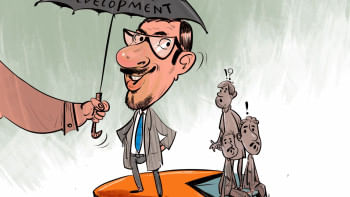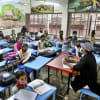Education needs resolute leadership of new ministers

It is a fact that the future of the new generation and the nation depends on resolute and forward-looking leadership in the education sector. I congratulate the newly appointed Minister of Education Mohibul Hasan Chowdhury and the Minister of State for Primary and Mass Education Rumana Ali. They now have the crucial role of leading education in Bangladesh.
Although education has progressed and expanded in numbers, foundational education for all children, tertiary education, and technical and vocational education have not seen the necessary improvement in quality and character. Families have to pay a lot for their children to be privately tutored, as test and exam fees, and as sundry payments for school activities, even during the supposedly free primary level of education. And as there is no state commitment to providing free secondary education, family spending at this stage is even higher.
The education that a child can acquire is currently a matter of how much his/her family can pay, as is the case when buying a commodity in the market. Education, therefore, has become an instrument that further widens the prevailing inequality in our society.
The National Education Policy 2010, despite some compromises, at least provided an outline for a relevant education system. A major component in the policy was a common school education experience of equal quality for all children. But no work plan was prepared or coordinated effort was made to act on realising this goal. There was also a recommendation in the policy to form a statutory, high-powered, and permanent education commission to guide and oversee this admittedly complex effort. No action along this line has been taken in almost one-and-a-half decades.
At the primary and secondary school levels, the majority of children are not acquiring foundational skills and competencies such as reading and writing in Bangla and the four rules of mathematics. These foundational skills are essential for participation in the later stages of education or in technical and vocational training. World Bank reports indicate that this failure has trapped Bangladesh, and many other low-income countries, in a learning poverty cycle.
First, acquiring foundational knowledge and skills in primary and secondary schools is the right of all children. The divided jurisdiction of two ministries over school education has prevented the adoption of a comprehensive and coordinated plan in this regard.
Second, the highly centralised and top-down management of the education system, with some 40 million students and 200,000 institutions, has failed to deliver services that are responsive to local needs and to the market in an accountable and effective way.
Third, enough investment should be ensured for education of acceptable quality. The excuse of the state's resource scarcity doesn't hold. Neighbouring countries and other low-income countries allocate an annual public budget per student more than double the average of the $200 in Bangladesh. Investment in education, as a proportion of the GDP, has been shrinking instead of rising in Bangladesh. In this case, decentralised and accountable management can ensure a better use of resources.
Fourthly, there is a lot of talk about the use of technology in education. Yet, in terms of infrastructure, connectivity, devices, maintenance, and operating costs, Bangla digital content (that aligns with the syllabi), and adequate training of teachers, there are significant shortages. These deficits have impeded the development of the blended approach that combines classroom teaching and ICT-assisted learning. Rather, easier access of the privileged to ICT has widened their gap with the majority, who remain deprived.
Fifth, teachers' skills, competence, and professionalism determine the quality of education and the learning outcome for students. The shortages in both the number of teachers and their professional quality have impeded efforts to improve the education system's performance. Yet, creative initiatives, going beyond the conventional approach, to prepare talented young people for the teaching profession and retain them in it, have not been taken.
Lastly, inaction or lack of decisions regarding all these matters are symptoms of political failure. Narrow and short-term political considerations have stood in the way of educational transformation. The interest of education and learners, not of political loyalty and partisan gains, should guide educational governance and management decisions.
The fragmented, partial, and symptomatic remedy approach is illustrated by the new curriculum initiative. The premise of the initiative is that, instead of memorising guidebooks, acquiring private tuitions, and relying on frequent tests, students (through group work and projects) will joyfully engage in learning and acquire defined skills. The current frequency of exams will stop, private tutoring and coaching will become unnecessary, and grading in student assessment will cease. Teachers will track and record the continuous progress of each student, and their assessment will be added to a summative evaluation at the end of the year and in public examinations (of which there will be three: in Class 10, 11, and 12).
Textbooks are being rewritten under the new curriculum, teachers are being trained, and teachers' guides are being distributed. An app has been designed for recording students' continuous progress. This is how the new generation will be groomed as skilled workers for the fourth industrial revolution and as smart citizens for the 21st century.
But how can we realise this desirable dream? How ready are schools and teachers to take on the difficult tasks assigned to them? The premise and goals of the curriculum reform cannot be said to be fully operational in all institutions even in developed countries. Moreover, traditional pedagogy is not all redundant. Schools everywhere still teach the matching of the alphabet and the phonemes, and memorising the multiplication table, algebraic formulas, the symbols of elements in chemistry, and the basic rules of grammar.
It is important to pay attention to all the major aforementioned problems of Bangladesh's education system to effectively reform how we teach the current and next generations. It is a need of the time to initiate a mega programme for the comprehensive and coordinated transformation of our education sector. Two initial steps that can be taken in this direction are to assign the oversight of the education system to one ministry (with various divisions) and to form a permanent statutory education commission. A major concurrent leadership agenda must be to protect education institutions and governance and personnel decisions from partisan political interference.
Dr Manzoor Ahmed is professor emeritus at BRAC University, chair of Bangladesh ECD Network, and adviser to Campaign for Popular Education. Opinions expressed in this article are his own.
Views expressed in the article are the author's own.
Follow The Daily Star Opinion on Facebook for the latest opinions, commentaries and analyses by experts and professionals. To contribute your article or letter to The Daily Star Opinion, see our guidelines for submission.

 For all latest news, follow The Daily Star's Google News channel.
For all latest news, follow The Daily Star's Google News channel. 










Comments